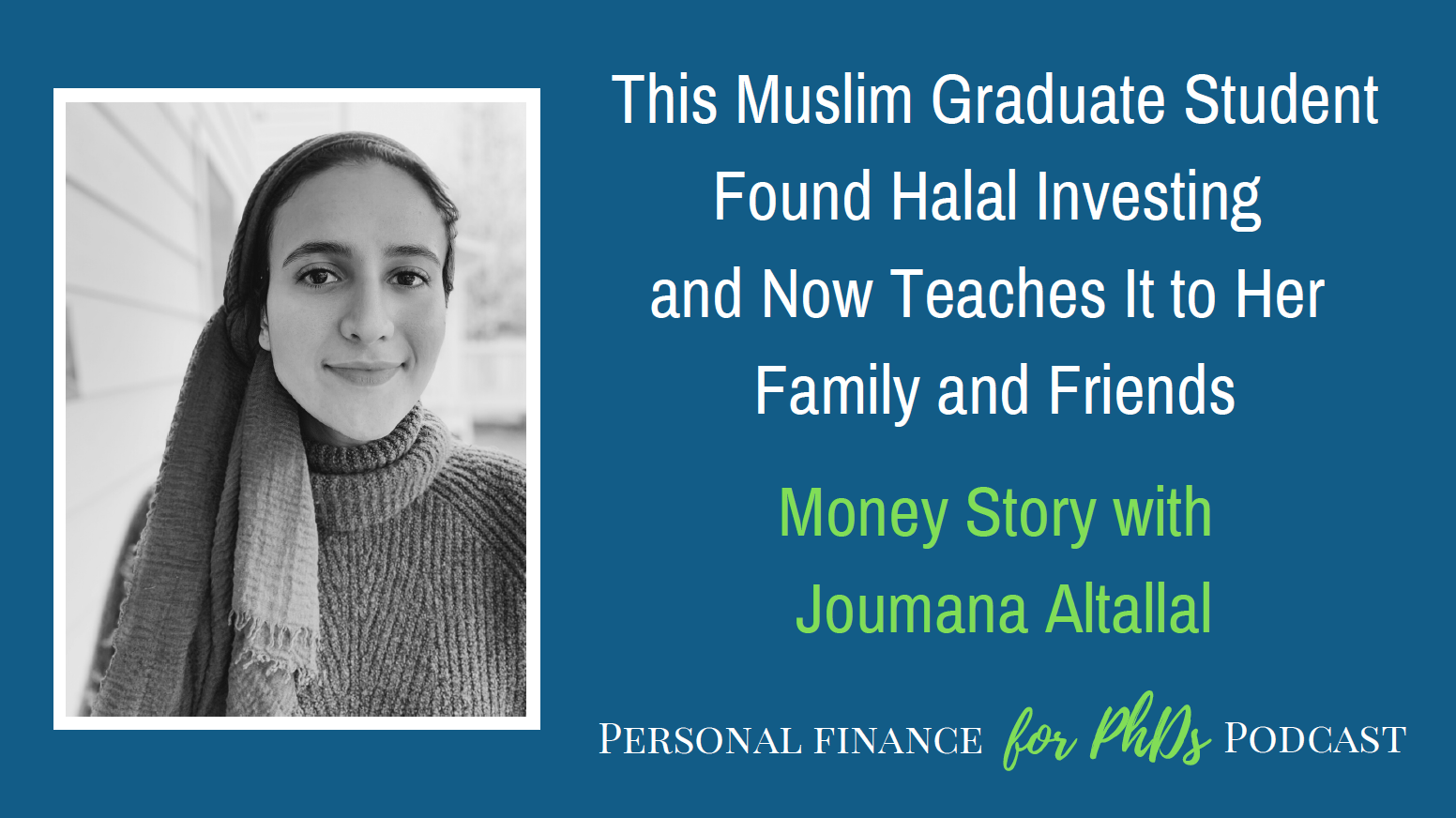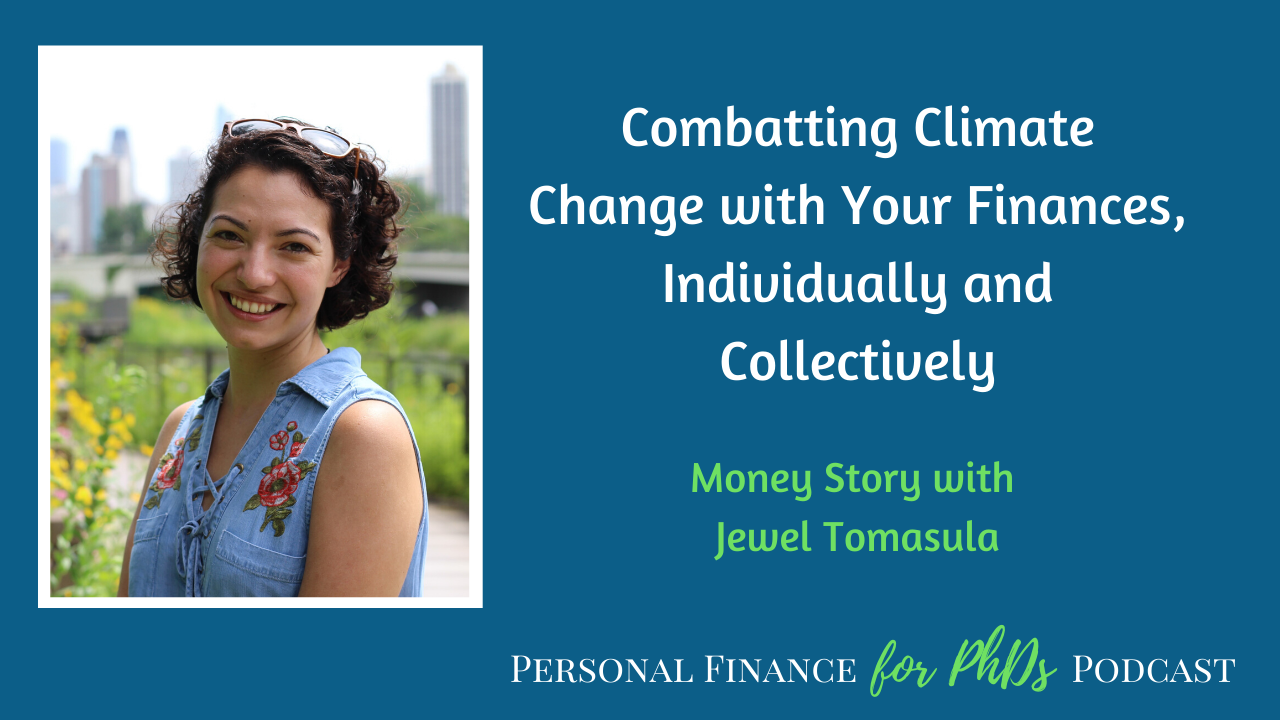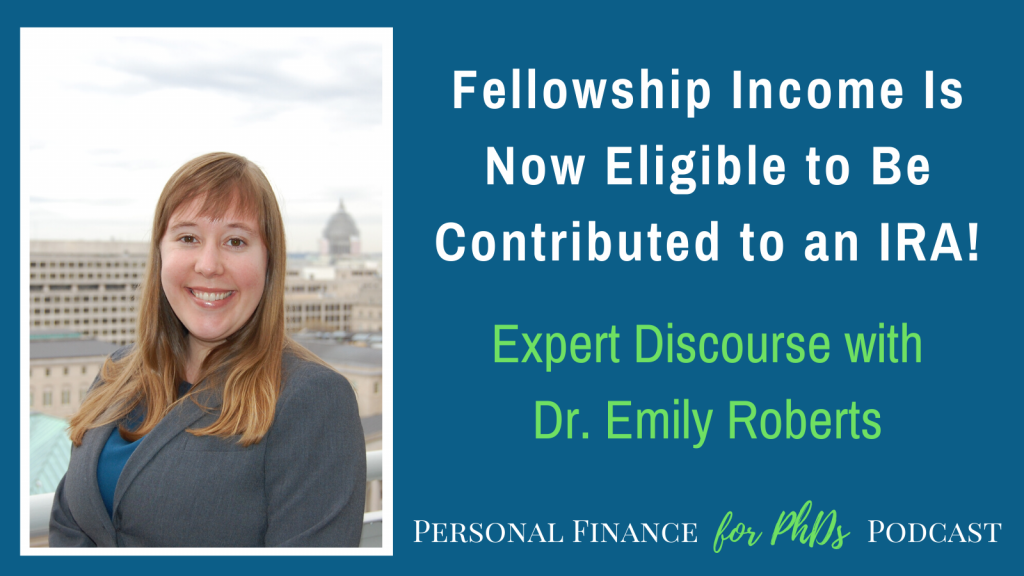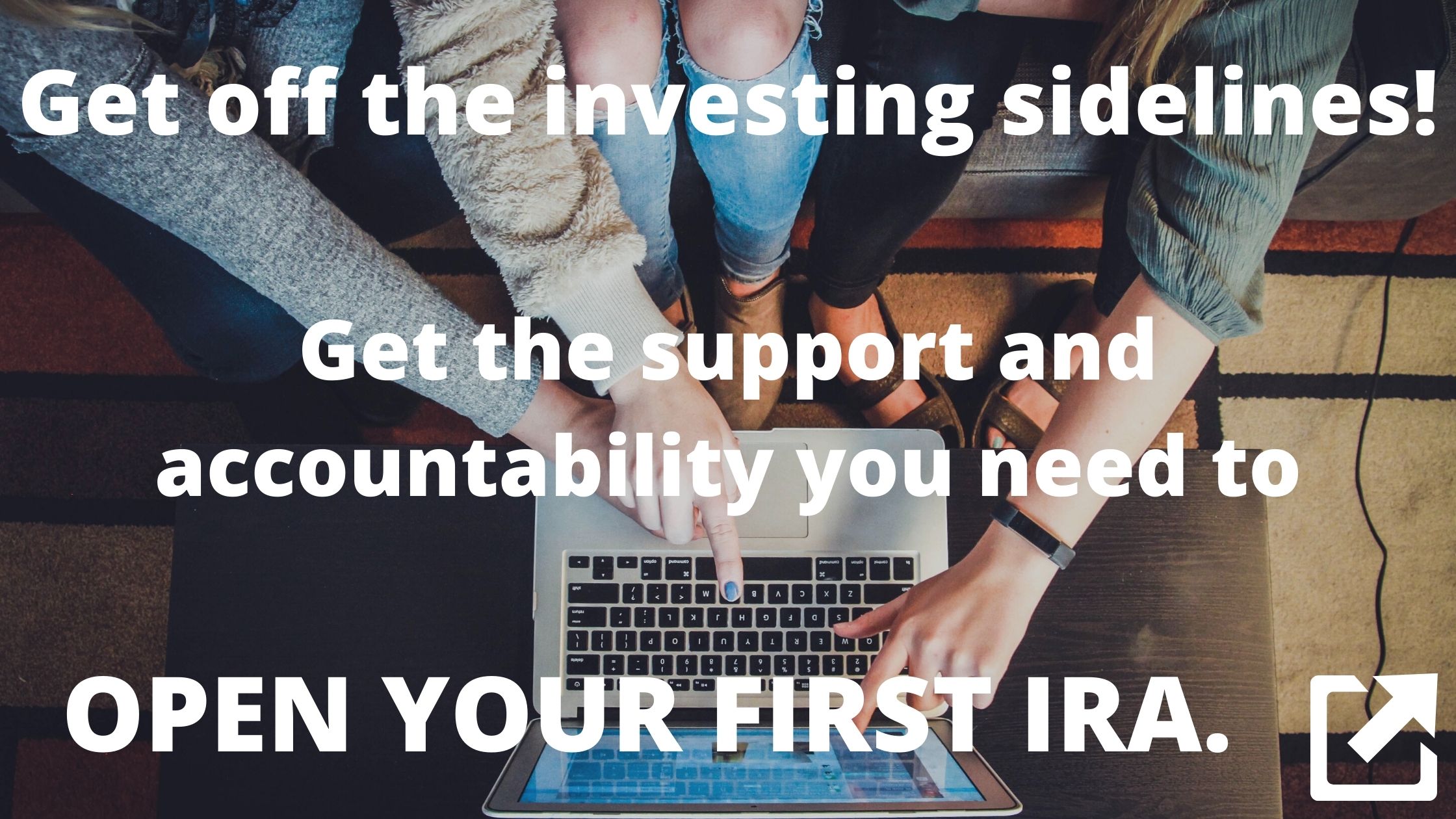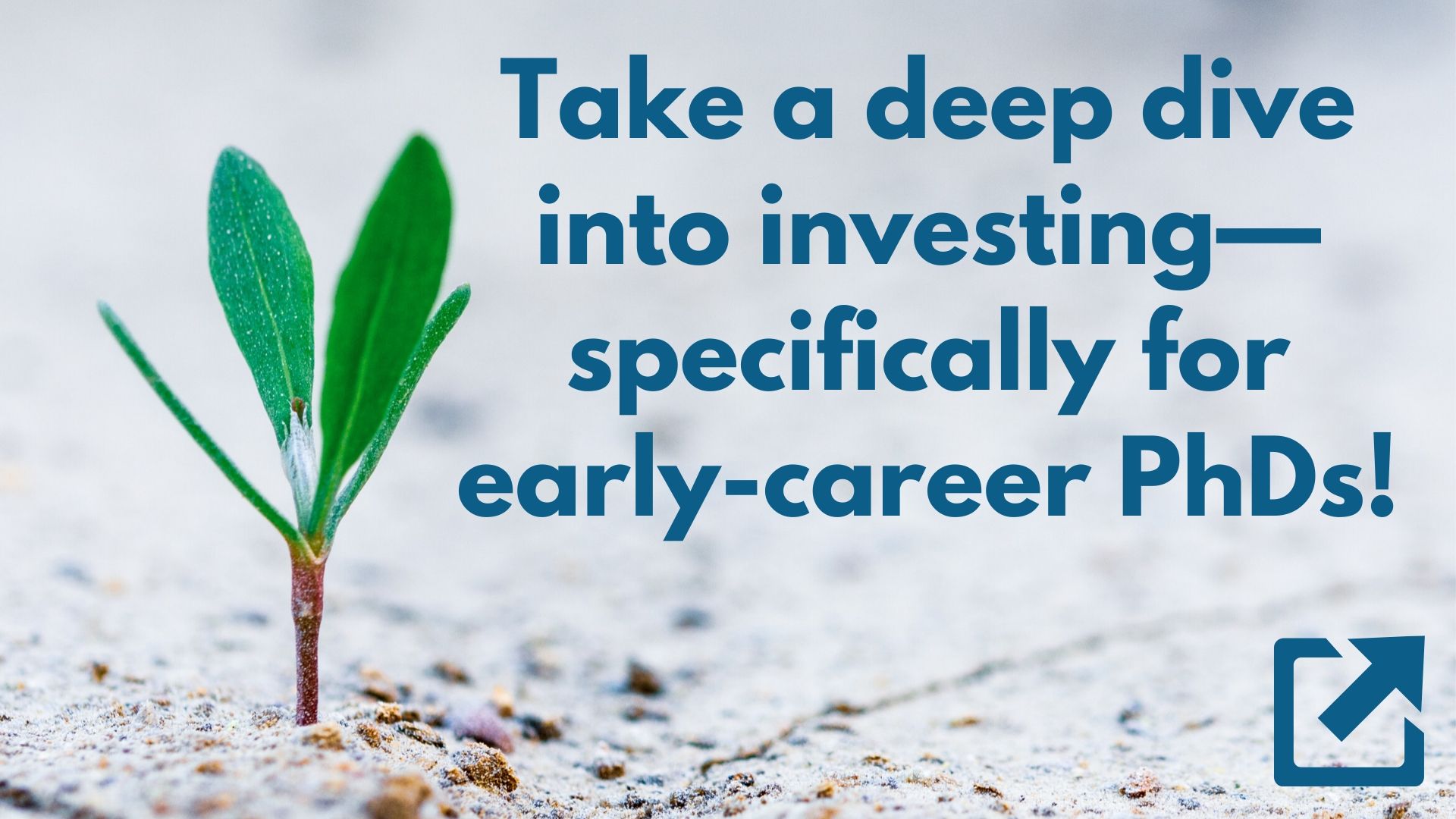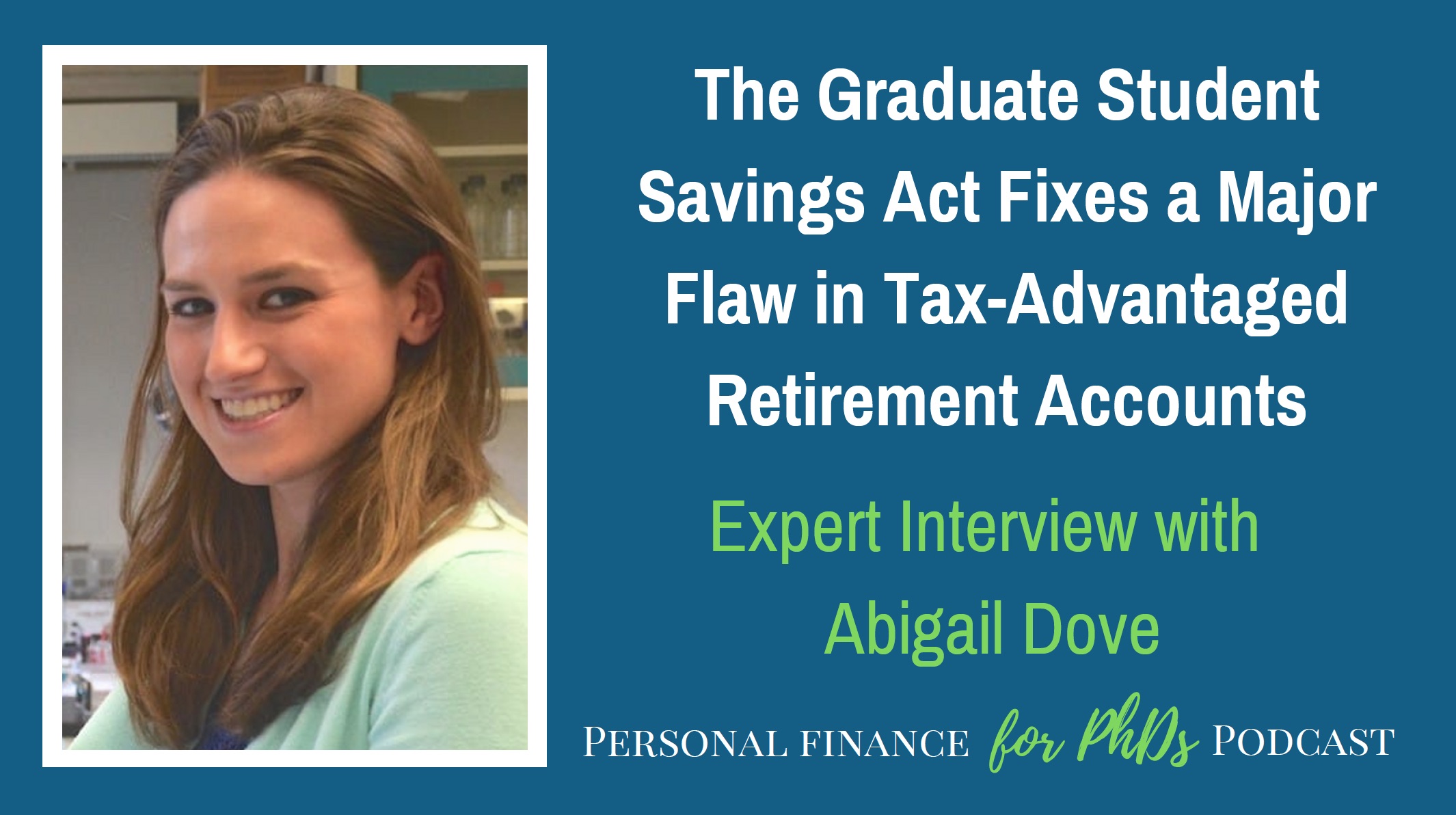In this episode, Emily presents why and how you should increase your retirement account contribution room. She gives a compelling compound interest example calculation that illustrates why you should start investing early in your career and reviews the types of tax-advantaged retirement accounts you might have access to and why you should use them if you can. If you would like to increase your available contribution room in tax-advantaged retirement accounts and you are self-employed, the last part of the episode is for you. You can open a tax-advantaged retirement account through your business, even if your business is new or tiny or unincorporated. Emily compared the three most popular self-employment retirement accounts and evaluated which is most advantageous for a solopreneur side hustler, as so many PhDs are, in a video training she recently added to the Personal Finance for PhDs Community. In this episode, she tells you about the training, what motivated her to create it, and how to avoid making the same mistakes she did with her self-employment retirement account. You can access the training by joining the Personal Finance for PhDs Community at PFforPhDs.community.
Links Mentioned in This Episode
- The Personal Finance for PhDs Community
- Whether You Save During Grad School Can Have a $1,000,000 Effect on Your Retirement
- The Wealthy PhD
- Personal Finance for PhDs: Podcast Hub
- Personal Finance for PhDs: Subscribe to the mailing list
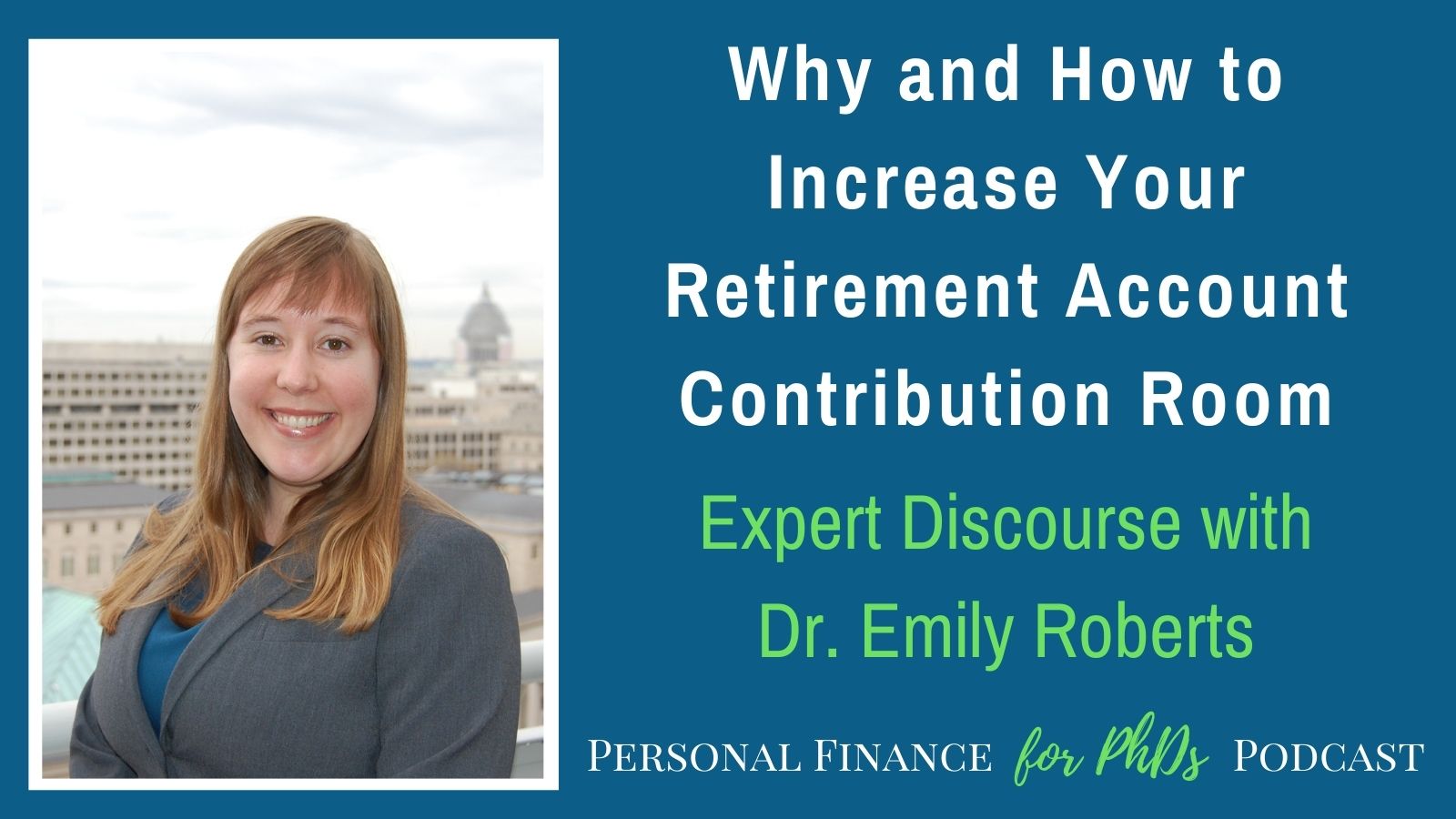
Welcome to the Personal Finance for PhDs Podcast: A Higher Education in Personal Finance. I’m your host, Dr. Emily Roberts.
This is Season 7, Episode 9, and today I don’t have a guest but rather am going to tell you why and how to increase your retirement account contribution room.
I’ll give you a compelling compound interest example calculation that illustrates why you should start investing early in your career. I’ll review the types of tax-advantaged retirement accounts you might have access to and why you should use them if you can.
If you would like to increase your available contribution room in tax-advantaged retirement accounts and you are self-employed, the last part of the episode is for you. You may not be aware, but you can actually open a tax-advantaged retirement account through your business, even if your business is new or tiny or unincorporated.
I compared the three most popular self-employment retirement accounts and evaluated which is most advantageous for a solopreneur side hustler, as so many PhDs are, in a video training I recently added to the Personal Finance for PhDs Community.
In this episode, I’ll tell you about the training, what motivated me to create it, and how to avoid making the same mistakes I did with my self-employment retirement account. You can access the training by joining the Personal Finance for PhDs Community at PFforPhDs.community.
I highly recommend going through the training if you are looking for more retirement account contribution room. It might even convince you to start a self-employment side hustle for that express purpose. This episode is specific to the US and is not tax, legal, or financial advice for any individual.
Without further ado, here’s my episode, on why and how to increase your retirement account contribution room.
Why You Should Invest for Retirement Early in Life
To build my case, I need to start by showing you why you should invest for retirement early on in your life.
There is an example I use in my seminars that makes a big impression on at least a few people in the audience.
This is a compound interest calculation, and you can follow along with it and play with some numbers of your own using a compound interest calculator such as the one at Money Chimp, which is linked from the show notes.
Compound interest calculations model the exponential growth of money over time with a given rate of return. It’s a way of modeling the returns you can get in the stock market, for example, though this calculation has a steady rate of return and your rate of return on stock investments would fluctuate quite a lot year to year. It’s a good model if you’re calculating returns over long periods of time.
So here’s the example:
Let’s say you’re able to save and invest $250 per month. That’s 10% of a $30,000 per year stipend or salary. You have no starting balance with your investments, and your money gets an average annual rate of return of 8%. You do this over five years, for example while you’re in grad school or a postdoc.
After five years, you have contributed $15,000 and your money has grown to $18,369. That might not sound too impressive yet but just wait!
Now, let’s take that $18,369 and let it keep growing with an 8% average annual rate of return. You’re not going to add any more money to this particular pot. Let it ride for 50 years this time.
The balance in your investment account has now grown to $990,000. You heard me right! The money you contributed over just five years has, given enough time and a good rate of return, grown to just shy of one million dollars! This is the power of compound interest.
If you’d like to read this example for yourself and dissect it a bit, I’ve linked an article from the show notes about all the assumptions and so forth.
Here’s the takeaway point, though: Don’t discount any amount of money you are able to invest during grad school or your postdoc. Whatever money you manage to invest early in life is going to have an outsized impact on your wealth in your older years. So start early and save at as much as you reasonably can.
Of course, you’re not limited to investing for retirement to an early five-year period of life. I hope that you will continue to invest throughout your career in larger sums than $250 per month. That doesn’t take away from the importance of starting early.
Why You Should Use a Tax-Advantaged Retirement Accounts
That’s the case for investing in general. Now I’m going to tell you why you should use a tax-advantaged retirement account for your very long-term investments.
What do I mean by tax-advantaged retirement account? Basically, the federal government gives a tax break to incentivize people to fund for their own retirements in particular. Money that has been contributed to a tax-advantaged retirement account is shielded from income and capital gains taxes.
These tax-advantaged retirement accounts go by many names, such as Individual Retirement Arrangement or IRA, 401(k), 403(b), 457(b), Thrift Savings Plan or TSP, and there are even more.
If you invested in a regular taxable investment account, you would pay your full income tax on the money you invest, plus every year there might be some small bites taken by income or capital gains tax. How large the tax bites would be depends on what you’re invested in, how long you’ve held the investment, and how high your overall income is.
Instead, with a Roth tax-advantaged retirement account, you pay your full income tax on the money you contribute, and then the money grows tax-free while it’s in the tax-advantaged retirement account and you can withdraw it in retirement without paying any income or capital gains tax.
A traditional tax-advantaged retirement account allows you to deduct your contributions to it from your taxable income in the year you contribute. The money grows tax-free while in the tax-advantaged retirement account, and then you pay ordinary income tax on the withdrawals in retirement.
It is a great strategy to use a tax-advantaged retirement account for money that you’re sure you won’t need access to until your retirement. While in any given year the tax you might pay on investments in a regular account might be fairly small, the cumulative effect on your investment balance over decades of this is a bit like a death by a thousand cuts. Plus, once you are in your peak earning years, it’s quite a valuable tax break to be able to deduct your contributions to a traditional tax-advantaged retirement account.
The tax break on the growth in a tax-advantaged retirement account alone typically amounts to tens or hundreds of thousands of dollars over the course of an investing lifetime. This again demonstrates the power of compound interest, because the biggest part of the difference is not in how much you pay in tax, but in how much that money could compound and grow if you were able to leave it invested instead, which is what a tax-advantaged account does.
Add to your investment balance some hundreds of thousands of dollars more if you are able to use Roth and traditional tax-advantaged retirement accounts to selectively pay ordinary income tax in retirement and/or your lower-earning years instead of in your peak earning years.
What Is Contribution Room?
I hope I have convinced you of the power of investing and specifically inside a tax-advantaged retirement account.
Now, I’ll define a term I’m going to use quite a bit in the remainder of this episode: contribution room.
Contribution room is the maximum amount of money you are permitted to contribute to a tax-advantaged retirement account in a given year.
For example, graduate students and postdocs who are not employees of their universities or institutes are not extended retirement benefits, so their only tax-advantaged retirement account option is an IRA. If you are under age 50, the annual contribution limit to an IRA is $6,000 in 2020.
Graduate students who are employees of their universities or institutes are only very rarely extended retirement benefits; it’s worth checking into but don’t get your hopes up.
If you are an employee in the private sector, it’s typical to have access to a 401(k), perhaps even with a matching program. If you are under age 50, the annual employee contribution limit to a 401(k) is $19,500 in 2020. Your total contribution room between a 401(k) and an IRA is $25,500.
If you are an employee in the non-profit sector, such as at a university, it’s typical to have access to a 403(b), perhaps with a match or a fixed contribution by your employer. If you are under age 50, the annual employee contribution limit to a 403(b) is $19,500 in 2020. You might also have access to a 457(b). If you are under age 50, the annual employee contribution limit to a 457(b) is $19,500 in 2020. Your total contribution room between a 403(b), a 457(b), and an IRA is $45,000.
You can see that the contribution room available to you as a full-time permanent employee is much, much greater than if you are a fellow or graduate student. This is why there is such a focus on contributing to 401(k)s and similar and less so IRAs.
Now we come to the question of how to create more contribution room. Of course, you only need more contribution room if you are currently maxing out the contribution room available to you.
When I was in grad school, I never maxed out my IRA. So if you are maxing out your IRA as a grad student, please hear me: You are a rock star. I am not telling you that you have to contribute more. I’m only going to show you how you can if you already want to.
If you are maxing out a 401(k), etc., you are also a rock star. But if you want to contribute even more to make up for lost time or hasten your retirement date, I can show you how.
Self-Employment Retirement Accounts
The specific strategy I’m teaching you today is about self-employment retirement accounts and how they can supplement your IRA, 403(b), etc.
But to have a self-employment retirement account, you have to own a business. That could sound like a really fancy, complicated thing, but it definitely doesn’t have to be. All I mean is that you file a Schedule C with your tax return, assuming your business is unincorporated. You might describe yourself as a freelancer, an independent contractor, a gig worker, a solopreneur, or self-employed.
You know as well as I do that lots of graduate students and postdocs have side hustles to supplement their pay, and many of those, whether the person thinks about it this way or not, are businesses. Again, if you file a Schedule C with your annual tax return, this information is for you.
If you aren’t a business owner and have no plans to become one but you know a grad student or PhD who might be interested in this strategy, please share this episode with them!
I’ve covered the two main requirements you should check off before pursuing a self-employment retirement account: 1) that you own a business and 2) that you want more contribution room in tax-advantaged retirement accounts.
My Story and My Client’s story
I’ll tell you what motivated me to first investigate self-employment retirement accounts a few years ago.
When my husband and I were in grad school, as I mentioned earlier we never maxed out both of our IRAs. So even though I did have some self-employment income by the end of grad school, we had no need to open a self-employment retirement account.
We defended in 2014, and in the year following, my husband was a postdoc employee and I had self-employment income, so we had our two IRAs plus access to a 403(b), and we didn’t get anywhere close to maxing out that contribution room.
Halfway through 2015, my husband took a job at a start-up that offered a 401(k). That was when our household income really jumped up. We knew we would need more contribution room than just our IRAs to meet our retirement investing goal of 20%.
However, the 401(k) offered by my husband’s job was and is really expensive. It’s offered through Edward Jones and composed of American Funds, both of which are notorious for charging high fees. And the company doesn’t offer a match.
So in 2015, I read up about self-employment retirement accounts and opened one for Personal Finance for PhDs. We had a lot of options in where to open the account and which funds to purchase within it, so we could keep the costs really low. And that’s been our tax-advantaged retirement investing strategy for the past five years. We can meet our retirement investing goal using our IRAs and my self-employment retirement account. If we do ever need more contribution room than those accounts provide, we will use the expensive 401(k), but not until.
Your motivation to use a self-employment retirement account to increase your contribution room might be different from mine. Honestly, I didn’t imagine that any graduate students, for example, would want to contribute more than the $6,000 IRA ceiling.
But I was wrong. One of my recent coaching clients through The Wealthy PhD, a grad student, maxed out her 2020 IRA, but had some additional money that she was interested in getting into a tax-advantaged retirement account. She did freelance work on the side of her role as a graduate student, so I suggested that she look into self-employment retirement accounts.
Self-Employment Retirement Account Options
Our conversations throughout that program on this topic inspired me to create a new training inside the Personal Finance for PhDs Community titled “Self-Employment Retirement Account Options.” You can access the training by joining the Personal Finance for PhDs Community at PFforPhDs.community.
As you can tell, I love to encourage PhDs to invest early on in their careers, even during grad school or a postdoc. I also love teaching about taxes. So this training is a perfect crossover point between my two favorite personal finance subjects, and it stretched me quite a bit as well as I learned lots of new things.
The objective for “Self-Employment Retirement Account Options” is to help you choose which self-employment retirement account type is right for you and your business. I haven’t mentioned it yet, but there are at least half a dozen high-level options and many of those have various permutations.
As I was sifting through these options to decide what to include in the training and in what depth, I kept in mind my coaching client who inspired the training. There is a lot of information out there about self-employment retirement accounts, but it’s largely intended for people who work full-time in their business, like I do, or even for small businesses with employees.
What I decided to do with the training in the Personal Finance for PhDs Community was to create it with a side hustler in mind instead—a solopreneur who has only a few thousand dollars in self-employment income—but who wants to maximize their retirement account contribution room even on that smaller income. When you frame the question that way, I believe the best choice becomes much clearer.
I included in the training detailed information about the three most popular self-employment retirement account types. The less popular account types are not ideal for a side hustler or solopreneur. The types I included are SEP-IRAs, SIMPLE IRAs, and one-participant 401(k)s.
Across these three account types, I compared the type of business they are ideal for; their employer, employee, and overall contribution limits and formulae; whether a Roth version is an option; and their deadlines to set up. For each account type, I also calculated the overall contribution limit for someone whose net business profit is $24,000 per year, an amount that highlights well the differences among the plans.
I also show you how contributions you or your employer make to a retirement account offered through your primary job affect your contribution room within each of the types of self-employment retirement accounts. This information is not the type you uncover by reading quick summaries of various account types, but it is crucial for a side hustler.
Ultimately, I recommended one account type over the others. I present whether that account type can be opened at 13 of the most popular brokerage firms today and a few specifics about the account at each of the firms where it is offered, such as what fees are charged. All of that is to save you a bit of research time when you are actually going to open your account.
I admit I did not do any research on the best place to open my self-employment retirement account. I opened it with Vanguard, which is where I had all my other investments. It was quite surprising to me when I looked around at other brokerage firms to find that Vanguard is not necessarily the best option.
The very last module in the training shows you how to use a certain IRS worksheet to calculate your contribution room, and I show four calculation examples. This module is really in the weeds, but should be super helpful for someone who trying to put as much money as legally allowed into their self-employment retirement account.
I actually didn’t know about this worksheet a couple of years ago when I accidently slightly overcontributed to my self-employment retirement account. Once I realized my mistake, I had to reverse that contribution in a slight panic right before the tax deadline. I don’t want anyone else to go through that process or overcontribute and not catch the mistake, so that’s why I included this module.
Summary
Let’s come back around to the compound interest illustration that I relayed at the beginning of this episode. Given the assumptions in that example, investing $250 per month for five years and then letting the portfolio grow for fifty years resulted in a balance of almost one million dollars.
Whatever your saving rate, increasing it by $250 per month is going to have a very impressive outcome, either in more wealth in retirement or achieving financial independence even earlier.
If your budget has no room for additional investing right now but you have a bit of time on your hands, consider pursuing a self-employment side hustle such as consulting; freelance research, writing, or editing; tutoring; baby or pet sitting; or gig work.
To invest $250 per month in the type of self-employment retirement account that I recommend, you only need to net $269 per month through your business. Let’s round it up to $350 per month to account for income and self-employment tax.
If you earn $15 per hour after expenses, you can earn $350 in 23 hours of work, or less than 6 hours per week.
At $25 per hour, that’s 14 hours of work in a month or between 3 and 4 hours per week.
If you charge $50 per hour, which is quite moderate for some of the types of work I mentioned earlier, you can earn $350 in just seven hours of work per month. Increase it to $100 per hour, and you’re down to less than 1 hour of work per week to meet your goal.
If you think that charging $50 or $100 per hour is outlandish, you’re probably anchoring against what you’ve been paid as an employee and/or for work outside of your unique skill set. Capitalize—literally—on the skills you built or are building during your PhD to command higher pay rates.
Do you think you can find between 1 and 6 hours per week to devote to a side hustle over just five years if it can become an extra million dollars fifty-five years from now?
If you’re already there with your self-employment side hustle or will be soon, please consider joining the Personal Finance for PhDs Community to take the Self-Employment Retirement Account Options training. You will learn which self-employment retirement account is best for you and your business and where to open one to protect your investments from taxes and maximize their growth over the decades. You can access the training by joining the Personal Finance for PhDs Community at PFforPhDs.community.
